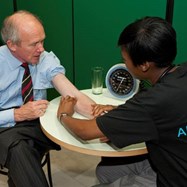Government should focus on main barriers to fairer access
21 July 2011
Commenting on the report published today by the Government’s Advocate for Access to Education, Dr Wendy Piatt, Director General of the Russell Group, said:
“Simon Hughes rightly identifies some of the reasons why too few students from non-traditional backgrounds apply to leading universities in the first place, including the fact that they are not getting the best advice on A-level and university course choices. He has raised some interesting ideas deserving further consideration. However, focusing too much energy and resources on new ideas and increased powers for OFFA could distract attention, effort and resources from solving the root causes of the problem: primarily underachievement at school – a vital factor which is given little attention in the report. The Government should also focus on helping universities make sure that students understand the financial support they will receive going to university.
“Russell Group universities already have a strong track-record of pumping millions of pounds into access initiatives including building extensive links with schools and colleges, offering intensive summer schools and providing substantial financial aid for the least advantaged students. We provide lots of information about admissions processes and our recent report Informed Choices seeks to provide students with better subject advice. Underprivileged students should be encouraged to access these schemes to maximise their chances of gaining a place at a leading university. It will be more productive to build on the most successful of these initiatives rather than calling on universities to implement untried new schemes.
“Of course, our universities have a role to play in helping students from under-privileged backgrounds to overcome the barriers they face, and we have never claimed otherwise. But we cannot solve this problem alone and there is also a vital role here for schools, and other agencies.
"We are wholeheartedly committed to broadening access so that every student with the qualifications, potential and determination to succeed at a Russell Group university has the opportunity do so, whatever their background. But admission to university should be based on merit and high academic standards must be preserved.
“Financial penalties for not meeting access targets would not only be unfair but they would also reduce money available for programmes to help poorer students win a place at all our universities.”
Notes to editors
- Even those students from disadvantaged backgrounds who have managed to achieve the necessary qualifications are less likely to apply to and attend the most selective universities than students from better-off backgrounds. Pupils from top independent schools make twice as many applications to the most selective universities as their equally well-qualified peers from the best comprehensive schools. (The Sutton Trust and DBIS, Applications, Offers and Admissions to Research Led Universities, August 2009.) We are also concerned by evidence that some teachers may not be encouraging even their best students to consider Russell Group universities. (The Sutton Trust and Institute of Education Primed for Success (2008). As Degrees of Success, the most recent Sutton Trust report, states, “Some schools are doing much better than others at enabling their students to fulfil their potential for degree-level study” (p.5). As the report notes, “there is widespread concern that poor advice may be contributing to the low progression rates in many comprehensive schools and further education colleges” (p.16). http://www.suttontrust.com/public/documents/sutton-trust-he-destination-report-final.pdf
- 29.92% of all students who got 3A*-As at A-level in 2009-10 were at comprehensive schools. This was 10,237 students, which is 8.2% of the total taking A-levels at comprehensives. Comprehensives accounted for 46.7% of all A-level students. By comparison, 11,386 candidates got 3A*-As at independent schools, which is 33.27% of all 3A candidates, and 32.3% of those taking A-levels at independent schools. Independent schools accounted for only 13.2% of all A-level candidates. (Source: DfE) In 2009, only 232 (or 4.1%) of students in maintained mainstream schools and known to be eligible for free school meals achieved 3 or more A grades at A-level. (See http://www.publications.parliament.uk/pa/cm200910/cmhansrd/cm100407/text/100407w0020.htm)
- By 2015-16, Russell Group universities in England will be spending collectively £28.8million on outreach activities and £153.7million on fee waivers, bursaries and scholarships for students. Russell Group institutions will be investing 32.3% of their fee income above £6,000 in these measures to widen access to poorer students – significantly more than many other universities. This represents an average per institution of £9.6million being spent on financial support to students, with some of our universities spending as much as £17million. Overall, this amounts to over £5.9million more per institution than the sector average of £3.7million. This investment will be targeted so that those in most need of financial support receive the help they need.
-
Hamir Patel
hamir.patel@russellgroup.ac.uk
020 3816 1316
-
Hollie Chandler
Hollie.Chandler@russellgroup.ac.uk
020 3816 1307
 X
X


